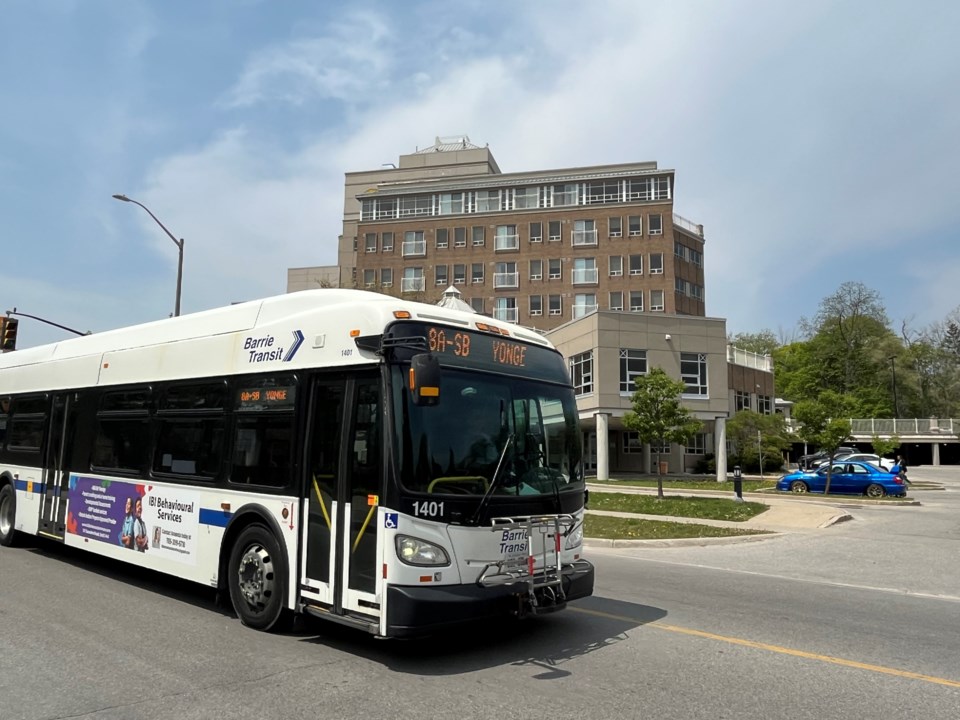One of Barrie’s largest retail developers says the city’s new transit network could be just the ticket for its customers and employees.
North American (Park Place), which is home to more than 60 retailers at 100 Mapleview Dr. E., says the network’s express service from Georgian College directly to Park Place, by way of Highway 400, would be particularly efficient.
“This service is planned to operate with a service headway of approximately 30 minutes, which is an improvement to the previous routes operating with 37- to 45-minute headways,” North American's Blake Sanderson wrote in a letter to city staff. “This upgrade in respect to the duration of headway service is great as it should lead to more trips taken daily, entice more of the public to utilize this transit network as a whole and potentially lead to a greater use of the local transit routes operating from the Park Place transit hub.”
Barrie councillors, sitting as general committee, will consider approving the new transit network Wednesday evening. City council could provide final approval June 21.
The network is designed to move as many people, to as many destinations, as quickly, frequently and reliably as possible. It could be rolled out in 2024 and be completely in place the following year.
“It is exciting to see the City of Barrie build a blueprint for growing its existing transit system to best meet the needs and goals of today’s city, while at the same time developing a long-term plan for a future network," Sanderson said.
The new network is to include express service, which would directly connect users between Royal Victoria Regional Health Centre (RVH) and Georgian College, Bayfield Street, Essa Road, and Park Place by a bus route on Highway 400.
“Park Place … provides a great number of jobs and opportunities to the students of Georgian College,” Sanderson said. “This transit connection will only aid in linking these two destinations.”
Frequency would be improved by giving 70 per cent of existing transit customers access to a 15-minute route in the new transit network for a portion of their trip.
Cross-city transit trip times would be reduced by approximately 13 per cent, and Barrie residents would have access to approximately 24 per cent more jobs within a 30-minute transit travel time.
There would be new transit coverage on Benson Drive, Hanmer Street, Lakeside Terrace, Amelia Street, Morrow Road, Caplan Avenue, and King Street.
These service changes have also been built to be cost-neutral, in terms of operating hours due to the Transit ON Demand service model, which allows the service to maintain and add coverage efficiently across low-transit demand areas in Barrie, according to city staff.
Transit ON Demand service is a morning/evening, peak-hour bus that accommodates the actual ridership demand, with a third peak bus available if ridership warrants it. Transit ON Demand is without a fixed schedule or route.
Users can book their trip through an application and then bus travel is optimized through a computer-based system. The service operates within a specific zone, allowing riders to travel from bus stop to bus stop within the zone on demand.
Sanderson says there are several advantages to the express route.
“It will be operating partially on Highway 400, thus minimizing the impact on city arterial, collector (and) local roads while providing a route with minimal stops between north and south Barrie,” he said. “By utilizing Highway 400 and spending less time on the local road systems, this is a better way of ensuring the transit system stays true to meeting their proposed headway times and leaving users more satisfied with their experience.”
Peak vehicle requirements for the new transit network would also see a change in the service vehicle types that would result in more than $10 million in capital cost reductions for growth or replacement vehicles in the city’s 10-year capital plan.
The new transit network is a response to the plans for the Allandale mobility hub and downtown mini-hub. Moving Barrie’s primary terminal operations requires route changes, so city staff say they took the opportunity to evaluate Barrie Transit’s entire network for potential changes to better meet the needs of today’s and tomorrow’s transit users.
The Allandale transit mobility hub is to provide inter-regional service, seamless transit connections between Simcoe County, Muskoka and the Greater Toronto Area and be integrated with two-way GO train services, located at Allandale Waterfront GO Station.
The mini-hub would include bus stops and sheltered waiting areas at 24 Maple Ave., which is the current Barrie Transit Terminal. The bus stops would maintain downtown Barrie Transit service and provide direct access routes to and from the core.
The network also responds to Barrie’s updated Official Plan, which has new and revised population projections, intensification corridors and strategic growth areas for transit to service. The new network is to provide enhanced service where growth is planned, before resident travel habits have been established.
Barrie’s transit ridership trends are changing, being influenced by numerous factors such as population growth, urban development, new technologies, environmental factors and changes in commuting patterns. The network responds to these trends by being more efficient, sustainable and accessible, reflecting a growing city, according to staff.
Brent Forsyth, Barrie's director of transit and parking strategy, says the 2023 operating budget for Barrie Transit is worth approximately $25.3 million. It is funded by $6.3 million from fares and passes, $400,000 from advertising revenue and $3.3 million from Ontario gas tax, with the remaining approximately $15.5 million comes from the general property tax levy.

